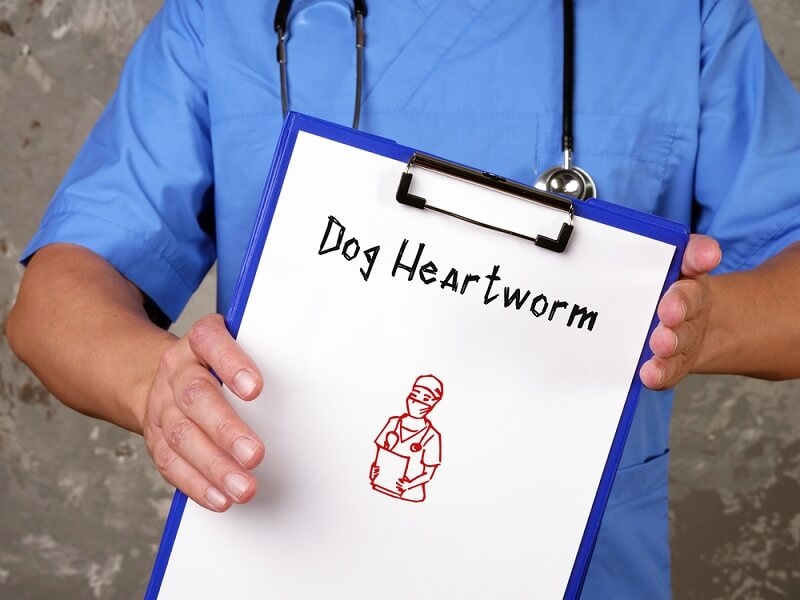
Canine heartworm disease is one of the most serious health risks for dog owners to be aware of. It is a potentially fatal condition caused by parasitic worms (Dirofilaria immitis) that live in infected dogs' hearts, lungs, and blood vessels. Finding a case of heartworm early is essential, and untreated cases can lead to heart failure, lung disease, damage to organs, and death! Knowing the signs of heartworm in dogs and using good heartworm protection for dogs is the best way to ensure your pet has a long and healthy life. You can avoid complications and danger with parasite protection for dogs, regular heartworm testing, and early veterinary intervention.
Canine heartworm disease is transmitted by mosquitoes infected with microscopic larvae known as microfilariae. When a mosquito bites an infected animal, it acquires the larvae, which are then delivered to a healthy dog through a feeding process. The larvae develop into adult worms within a span of about six months. The worms measure up to 12 inches in length and live for several years in the dog's heart and lungs.
Dogs are the natural host of heartworms, i.e., they can grow, reproduce, and develop in them. If left untreated, the number of worms increases, severely damaging the circulatory and respiratory systems.
Initial signs of heartworm in dogs are usually subtle, so that the pet owner may overlook them. Symptoms become more serious based on the number of worms, the duration of infection, and the dog's health.
Some of the most important signs to watch out for are:
Since these symptoms coincide with other diseases, routine heartworm testing for animals is imperative for a correct diagnosis.
Only through testing can one be sure about detecting heartworm disease in dogs, particularly in the early stage when signs may not be noticeable. Veterinarians usually advise annual heartworm testing, even for dogs receiving preventive medicine.
The test is a quick blood screen to determine if adult heartworms are present. In a few cases, other imaging, such as X-rays or ultrasounds, may be performed to determine how much damage has been done to the heart and lungs.
Scheduling regular heartworm tests for your pet will help check for any infection and give your dog the best prognosis for successful treatment.
The most effective way to address heartworm disease in dogs is to prevent it. Today, veterinary medicine offers various heartworm prevention options for dogs, including monthly chewable tablets, topical treatments, and long-lasting injections; all of these prevent the immature larvae before they become adult worms.
In summary, simple prevention tips are:
If you forget doses or delay preventive care at any time, your dog is unknowingly at risk for infection. Prevention is much safer, cheaper, and less stressful than treatment.

If a dog is positive, heartworm in dogs becomes an emergency. However, treatment must be done safely and with caution. Treatment typically consists of a multiple-step approach under the watchful guidance of a veterinarian to promote safety.
The treatment procedure includes:
When treatment works, it can be costly and is not without risk. This is why regular heartworm prevention for dogs is always the better option.
Your dog is at risk for more than just heartworm disease. Intestinal worms, fleas, and ticks also pose significant health risks. Comprehensive parasite protection for dogs means combining prevention methods for all parasites into one package.
As much as prevention medicine is not open to discussion, the dog's lifestyle also determines its chances of getting heartworm disease.
The best practices are:
Prevention is about preventive medicine and creating an environment that minimizes the risk of pest problems.
Identifying heartworm disease in dogs at an early stage can significantly impact treatment outcomes. Annual vet visits and routine heartworm testing of pets can stop the infection before it becomes severely damaging. Even if the dog does not appear symptomatic or is in its late stages of life, those subtle, spilling-over parasites could be hurting its heart and lungs. These possibilities make early screening a priority, and if it ends up infected, you may have the chance for early staging, intervention, effective treatment, and long-term survivorship.
Dogs' heartworm disease is a serious but manageable health condition. By identifying signs and symptoms of heartworm in dogs early on, making regular heartworm testing of pets a priority, and maintaining year-round heartworm protection for dogs, you can protect your pet from this deadly parasite. An active plan that encompasses full dog parasite protection will prevent heartworm infections and improve your dog’s overall health.
Keep this in mind: prevention is always easier and safer than dealing with a condition after it has occurred. Develop a parasite prevention plan with your veterinarian based on your dog’s lifestyle and put your dog in the best position for longevity and happiness.
How often should I test my dog for heartworms?
Annual heartworm testing is the advice of veterinarians for pets, even dogs, to be regularly on preventives.
Can heartworm disease in dogs be eradicated?
Yes, most dogs can recover with prompt veterinary care. But prevention is simpler, less dangerous, and less expensive.
What is the most effective heartworm prevention for dogs?
The best one for your dog depends on his needs, but monthly oral or topical drugs, accompanied by regular testing, are highly effective.
Are all signs of heartworm in dogs apparent?
No. Too many infected dogs have no early signs, so yearly testing is necessary.
This content was created by AI